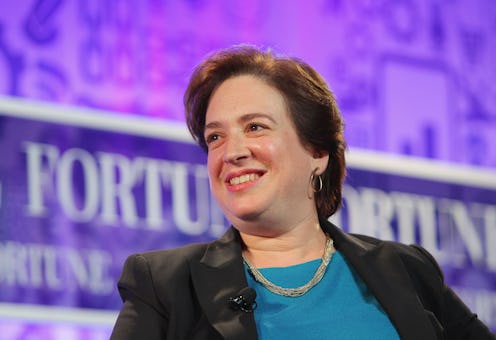News
These 7 Elena Kagan Quotes Will Inspire The Hell Out Of You

It's time to wish Supreme Court Justice Elena Kagan a very happy birthday. Kagan turns 58 on April 28, 2018, in the midst of her eighth year serving on the high court, and that makes it as good a time as any to revisit some of the things she's said and written throughout the years. So, in that spirit, here are seven Elena Kagan quotes about justice and honor that really illuminate how the New York-born judge views the world.
Kagan has been involved in some historic decisions throughout her time on the court. And that's by no means the extent of her career in law ― before being nominated by former president Barack Obama in 2010, she served as the solicitor general of the United States, and before that, the dean of the prestigious Harvard Law School. In short, she's spent the vast majority of her adult life considering and assessing matters of justice, and as such, there's no shortage of takes she's spoken and put to paper throughout the years.
So, to help mark and celebrate her birthday, here are seven examples of her takes on justice, the law, and how a member of the highest court in the United States should conduct themselves, so to assure that all different sides of an issue get a fair hearing.
Law Matters
After first being announced as the second Supreme Court selection of Obama's presidency, Kagan affirmed the importance of law in remarks from the White House, calling it the "foundation of our democracy."
Law matters because it keeps us safe, because it protects our most fundamental rights and freedoms, and because it is the foundation of our democracy.
The Times In Which They Live In
In 2010, in her first interview after being confirmed to the Supreme Court, Kagan told C-SPAN's Susan Swain that she believes a great justice knows how to balance fealty to the text of the law with an understanding of how it functions in modern times.
I think some justices are great because they have extraordinary wisdom, they have an understanding of how to apply the law in their times in a way that's completely consistent with the text of the law, and the purposes of the law, and that's also completely right for the times in which they live in.
No One Has A Monopoly On Truth Or Wisdom
During her confirmation hearing in 2010, Kagan introduced herself by reflecting on what she learned about "truth and wisdom" through her time at Harvard.
I've led a school whose faculty and students examine and discuss and debate every aspect of our law and legal system. And what I've learned most is that no one has a monopoly on truth or wisdom. I've learned that we make progress by listening to each other, across every apparent political or ideological divide.
She also hailed former justice John Paul Stevens for his approach to considering different arguments, which she summarized as "understanding before disagreeing."
My Political Views Or My Constitutional Views
During the confirmation process, Kagan downplayed questions regarding her own political views, maintaining that they didn't matter to her when it came time for her to rule on matters of law.
What my political views or my constitutional views are just doesn't matter.
Judges Will Have Goals
Despite what she told senators during her 2010 confirmation hearing, however, a far younger Kagan once held a different belief on the question of judges and their political and ethical views. As some conservatives pointed out at the time in the hopes of scuttling her nomination, she wrote the following in her 1983 Oxford thesis, back when she was 23 years old.
As men and as participants in American life, judges will have opinions, prejudices, values. Perhaps most important, judges will have goals. And because this is so, judges will often try to mold and steer the law in order to promote certain ethical values and achieve certain social ends. Such activity is not necessarily wrong or invalid.
Kagan ultimately disavowed and downplayed her thesis during her confirmation process, however ― according to Time, referring to herself as a "dumb" kid when she wrote it, but her words still carry resonance.
It's Time To Leave The Job
Kagan has also made it clear how she feels about the intersection of conscience and duty, something that comes up frequently in debates about justice. Specifically, she told the Senate during her confirmation hearing that someone who's conscience prohibited them from fulfilling their job's requirements should find a new job.
I think that if there are positions that you can't argue, then the responsibility is probably to resign. If one's own conscience is opposed to the requirements and responsibilities of the job, then it's time to leave the job.
Listening To Arguments And Talking To Colleagues
While it's not unusual for Supreme Court nominees to avoid pre-judging any cases or issues during their confirmation hearings, Kagan had a pretty sharp response to the late former Pennsylvania senator Arlen Specter when he attempted to get her to weigh in on a 1997 precedent.
You shouldn’t want a judge who will sit at this table and who will tell you that she will reverse a decision without listening to arguments and without reading briefs and without talking to colleagues.
In short, Kagan is not shy about standing on her principles, nor for the principal of judicial independence itself, and her view of how to carefully and ethically make considered judgments.